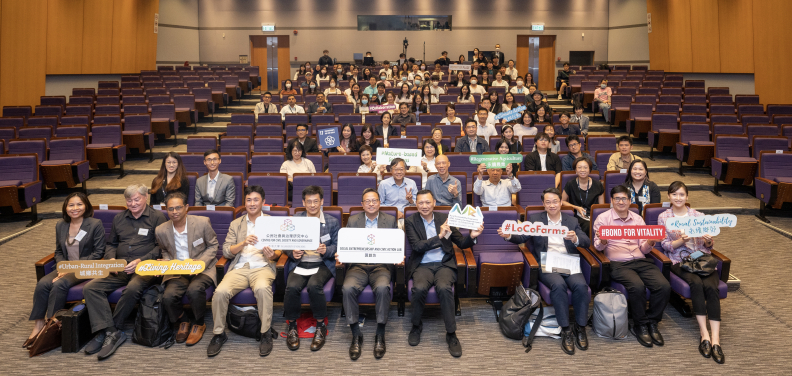Media
HKU Holds APAC Forum on the Roles of the University in Rural Revitalisation
17 Jun 2023
The Rural Sustainability Programme—Asia-Pacific Initiative for Regional Impact (AIRI) initiated by HKU in collaboration with Tsinghua University, Cheng-Chi University and Asian Institute of Technology held its first Regional Forum “Bridging Knowledge and Action: the Roles of the University in Rural Revitalisation” today at HKU. The Programme is supported by the Hongkong Bank Foundation. The Forum, accessible both physically and virtually, brought together over 230 participants from across the Asia-Pacific region to share their experiences and insights on how universities can play a critical role in rural revitalisation in cities that have gone through rapid urbanization and economic development.
Opening the event, Professor Ming Wen, Dean of Social Sciences, HKU, underlined the importance of rural areas, saying that they “house most of the sustainability capitals that are essential for combating today’s global challenges including climate change, food security as well as mental wellness and overall well-being of society”.
Echoing the theme of the Forum, Professor Tang Man Bun, Stephen, BBS, Head of the Countryside Conservation Office of the Environment and Ecology Bureau, Hong Kong SAR Government highlighted the University’s role in rural revitalisation at the officiating speech “In addition to accumulating and transmitting knowledge from the academic perspective, Universities play a key role as a cradle for nurturing future leaders in countryside conservation and environmental protection”.
To foster knowledge exchange and inspire regional partnership for rural sustainability, the event included three keynote dialogues focusing on 1) rural development and climate change, 2) urban-rural integration in China, and 3) creating future leaders; enabling an interactive discussion among academics and practitioners from Mainland China, Taiwan, Japan, Thailand and Hong Kong. Dr. Peter King, Senior Policy Advisor at Bangkok Regional Centre of Institute for Global Environmental Strategies, recommended combating climate change through rural sustainable development strategies, such as climate-smart agriculture, direct payments for ecosystem services, energy generation from waste biomass, and weather index insurance. Professor Fengtian Zheng of Renmin University of China used the 11 National Pilot Zones for Urban-Rural Integration to illustrate China’s experience in narrowing the urban-rural disparity and fostering urban-rural integration. Professor Hiroaki Ono, President and Representative Director of Eco-College in Japan, described how human resources development programmes, community support projects and university outreach programmes have helped build a strong pool of potential rural revitalisation leaders.
Following the keynote dialogues, a panel discussion session shed light on how universities can actively revitalise rural communities and incubate rural revitalisation change-agents. The session also examined how universities can collaborate with different stakeholders for rural revitalisation and discussed the opportunities and challenges for universities to play active roles in rural revitalisation.
Professor Wai-Fung Lam, Director of Centre for Civil Society and Governance, HKU concluded the Forum with the remark that “Today’s discussion is indeed inspiring as we mapped out the unique roles played by the university in the collaborative process. Some may say that we are the social entrepreneur; others may look at us as the facilitator. In whatever capacity, the roles of the university are indispensable – bringing in new perspectives, relevant knowledge and technology, and collaborative networks to foster positive change”.
Please click here to download photos of the event.
For media enquiries, please contact:
Ms. Mimi Kan, Centre for Civil Society and Governance, HKU (Tel.: 3910-2535; Email: mimikan@hku.hk)
About APAC Initiative for Regional Impact (AIRI):
Building on the success of the Sustainable Lai Chi Wo (2013-2017) and HSBC Rural Sustainability (2017-2022) programmes which have demonstrated the viability and merits of a community-based, integrated approach to rural revitalisation as a solution to sustainability challenges, the Centre for Civil Society and Governance at HKU launched the APAC Initiative for Regional Impact (AIRI). Supported by The Hongkong Bank Foundation, AIRI has established a regional consortium comprised of HKU, Tsinghua University, Cheng-Chi University and Asian Institute of Technology for knowledge co-creation and exchange. A core part of AIRI is the Urban-Rural Sustainability Fellowship 2022-23, which has trained over 90 Fellows and Associate Fellows for rural sustainable development in the Asia-Pacific region. To find out more information about AIRI, please visit: https://ccsg.hku.hk/airi/
About the Centre for Civil Society and Governance, HKU:
Established in December 2002, the Centre for Civil Society and Governance (the Centre) strives to enhance our knowledge of civil society and its contribution towards good governance, and to facilitate the attainment of a sustainable society through forging community-based, innovative solutions to inform policy deliberation and collective actions. The work of the Centre is organised around three Labs—the Policy for Sustainability Lab (PSL), the Social Entrepreneurship and Civic Action Lab (SECAL), and the Nonprofits and Philanthropy Lab (NPPL); each of them representing a research focus and an area of excellence of the Centre. To find out more information about the Centre, please visit: https://ccsg.hku.hk/

